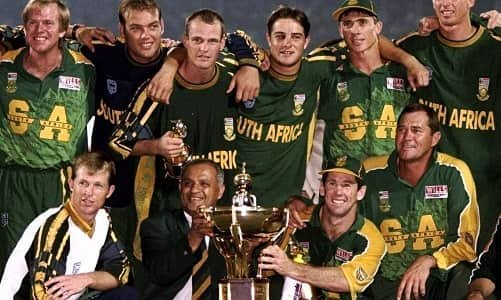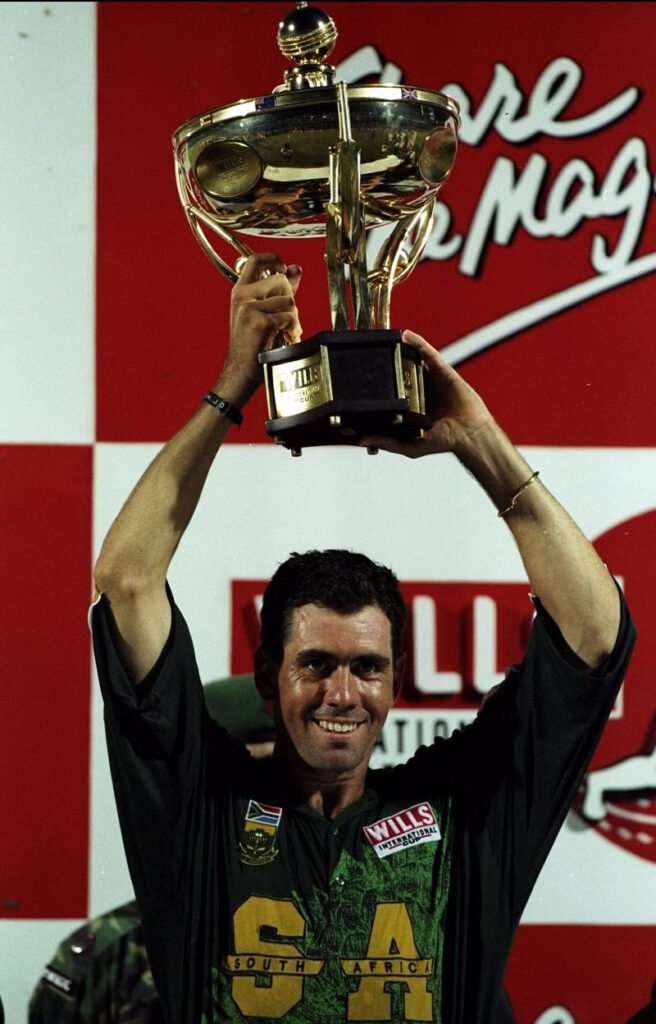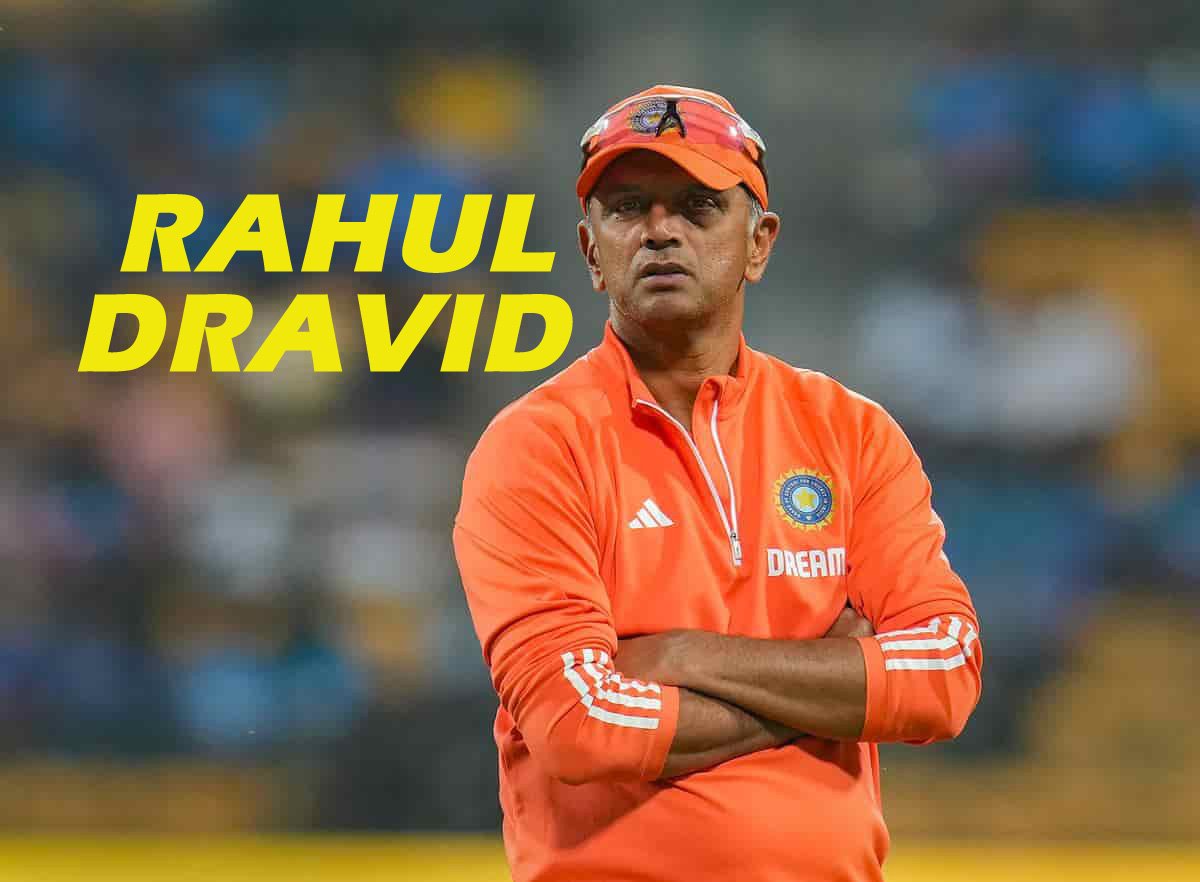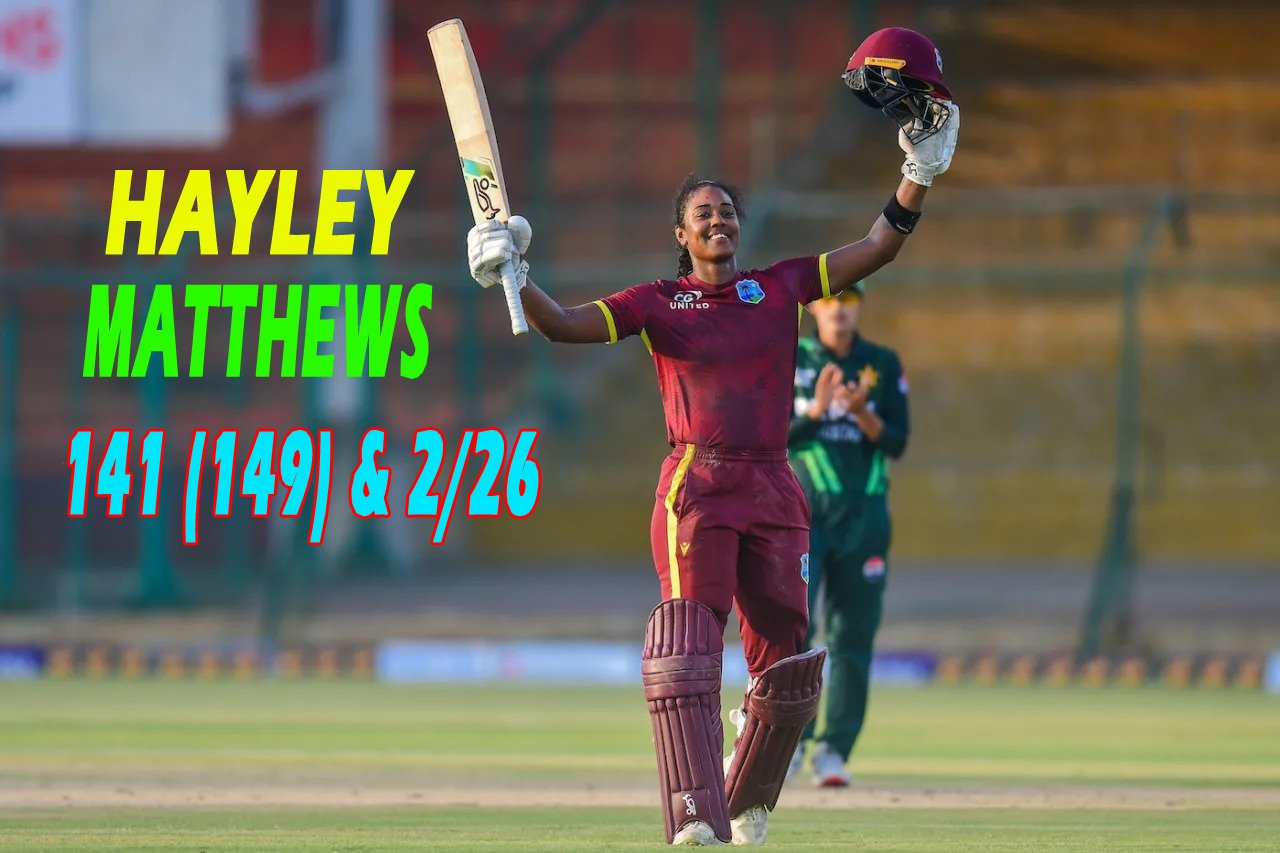South Africa’s journey to glory in the inaugural Champions Trophy against West Indies in 1998.
Led by Jacques Kallis, South Africa clinched their only major one-day triumph, an achievement they hold with great pride.
West Indies 245 (Philo Wallace 103, Carl Hooper 49; Jacques Kallis 5/30) were defeated by South Africa 248/6 (Mike Rindel 49, Hansie Cronje 61; Phil Simmons 2/45) with 18 balls remaining.
The Champions Trophy is one ICC competition that South Africa looks forward to rather than approaching with caution. They have only truly prevailed in one international competition. They were the first winners in 1998, and while it may not “carry the same prestige” as a World Cup, in Daryll Cullinan’s words, it’s still a victory they are extremely proud of.
Since South Africa had only been readmitted seven years prior, the team that traveled to Dhaka to play in the Wills International Cup was still relatively fresh to international cricket, so every experience was seen as a step toward their development. But they were more than just clumsy toddlers. Their victory in 1998 demonstrated that they had started to move with confidence.

“That was our prime at the time. We were without a doubt the top squad in the competition, according to Cullinan. South Africa’s big tournament success was a result of a variety of factors, including careful preparation, a steady accumulation of favorable outcomes, management of game elements like fitness, and having enough players to cover injuries.
The numbers made it obvious that they were the early favorites to win the competition. In the thirty months between the end of the 1996 World Cup and the start of the 1998 tournament, South Africa had the best record, despite not having played as many games as some of their opponents.
With 45 victories out of the 59 games they played, South Africa had a 76% success percentage. That was far more than any other squad could have. After playing 65.5% of their matches, the world champion Sri Lanka had defeated the West Indies (54%), Pakistan (52%), England (both 52%), and Australia (44%). Even with 97 matches played, India’s winning percentage was merely 39%.
The fact that South Africa won both bilateral and multi-team competitions may be even more significant. Ten ODI series were played by them, eight of which had three or more countries. Six of the ten were won by South Africa, including the Wills Quadrangular in November 1997 against Pakistan, Sri Lanka, and the West Indies and the Sharjah Cup in April 1996 against India and Pakistan in the United Arab Emirates.
They were used to being “ruthless,” as Cullinan put it, and were at ease with the rapid changes between matches that the 1998 event would require. Because Bob Woolmer had put in place the necessary systems, the ODI machine ran smoothly. In addition to expecting perfection from his players, he made sure South Africa was at the forefront of innovations by establishing significant alliances with other prominent athletes, such Tim Noakes at the nation’s Sports Science Institute.
“We were the first team to prioritize the physical aspect of things and to have a fitness trainer. In that regard, it would be easy to argue that we were global leaders, and Cullinan added that Australia was taking note of what we were doing.
According to Nicky Boje, leading the squad in a discipline rather than trying to catch up relieved some of their anxiousness. Boje remarked, “We didn’t feel too much pressure.” “Bob and Hansie managed the ship well. We all loved each other’s company, understood our roles in the group, and had some experience.”
South Africa had the systems in place to handle losing Shaun Pollock to a back injury on the eve of the tournament and without Allan Donald, Lance Klusener, and Roger Telemachus, who were forced into a period of rest (player management was in place even then). They brought in players like Alan Dawson, who made his debut in their opening game, and Steve Elworthy.
Also Read: South Africa’s Epic Win over Australia in 2006: Reliving the Thrilling Victory

The opening match for South Africa was in the quarterfinals against England, who were granted special permission to skip playing their first-choice team due to their Ashes trip. To his astonishment, Dawson was given preference over Elworthy and was plunged into the deep end when requested to open the bowling as well.
“I was rooming with Pat Symcox and I was very nervous the night before when I was told I could play,” Dawson recalled. “Symmo helped me to relax a little bit by reassuring me of what to expect and by providing some context. Even so, I was still in disbelief when I saw that there were perhaps 45,000 spectators on the field. I had never performed for such a large crowd. I was instructed to bowl the first ball, but I moved backward by approximately two feet because I was so afraid.”
After gaining composure, Dawson amassed a score of 1 for 51 in nine overs. He still clearly remembers how he took his first wicket in an international match. “It was Jack Russell, and Dale Benkenstein hooked him on the edge. During your career, there will be moments when you question your abilities and wonder if you can compete at the greatest level. When you succeed, it will be truly remarkable.”
With 20 balls left, South Africa managed to surpass their aim of 282. They were led by Cullinan’s 69 and made possible by the 117-run fourth-wicket stand between Jonty Rhodes and Cronje. Although Cullinan believed he could have made it even more compelling if he had persevered, it was a convincing start.
That day, there was an abundance of opportunities, plenty of time, and I was performing quite well. When I got out to Graeme Hick, I was enraged “said the man. “But we always knew if we played to our potential against England, we could probably beat them.”
Dawson was benched for the rest of the tournament despite the victory, and Elworthy was reinstated. “It was the right decision to play a more experienced guy as we got closer to the final,” Dawson stated. Looking back, he wasn’t just being polite.
In less than twenty-four overs, South Africa managed to dismiss Sri Lanka for 132 runs, thanks to three wickets apiece from Elworthy and Symcox. Their total of 240 was secured by Jacques Kallis, a 23-year-old, who struck 113 off of 100 balls. Considering Sri Lanka’s status at the time, Cullinan referred to it as “a big confidence booster”.
That day’s innings by Kallis remains memorable, particularly as he went on to be a major player in the match against the West Indies. With his 5 for 30, South Africa would have needed to score 246 to win a trophy.
They were declared the winners when they skillfully timed their chase and arrived at the goal after 47 overs. Cullinan, Boje, Dawson, and the rest of the team will always remember that day. “When you go into events like that you want to want to see where you are in terms of other teams but you also want to win to show the world you can,” Boje stated. “There was huge satisfaction in winning and a big party too.”
That was the closest Dawson, who participated in none of the World Cups, ever got to something of that size. “It absolutely felt like a big event and it was just awesome to be part of,” he stated. “In August of that year, I participated in and we won the Commonwealth Games. Thus, I was among the select few men who helped South Africa win two significant competitions.”
Among others in that group was Kallis, who won the Man of the Series title in Bangladesh, held the record for most wickets taken in the competition, and solidified his status as the nation’s future star. Prior to the competition, Kallis had played 48 One-Day Internationals and was already considered a unique talent. This display showcased his one-day brilliance at its finest, even if he had already proven it at the Test level with a century against Australia.
“We had anticipated Jacques would get up to that standard, so it wasn’t a surprise to us,” Cullinan stated. “At that time, he was bowling fast and swinging the ball, which was noteworthy. Watching it was quite stunning.” Though he is still regarded as one of the greatest cricket players in history fifteen years later, Kallis will not be available for South Africa’s final Champions Trophy campaign.

For personal reasons, the all-rounder, who is no longer involved in bilateral ODI series, requested not to be considered; Cullinan believes that his absence will negatively impact the team’s chances.
“Someone of Jacques’ character and with his presence brings confidence and belief into a side,” he stated. “Some of the younger players in the middle order, for instance, feel exposed and uneasy when Jacques isn’t in the starting lineup, even if they will never admit it. It’s important to remember that many guys are still competing for a spot on the team.”
Nevertheless, all three of the players who raised the trophy in 1998 agree that South Africa is capable of doing it again. “There are players like Dale Steyn and AB de Villiers who are match winners. I believe they can win if they adjust quickly, particularly in terms of batting,” Cullinan remarked.
Boje agreed with such evaluation. “Getting the middle order to perform will be the biggest challenge, but if they do, South Africa have every chance of winning.” According to Dawson, the club must now demonstrate to their supporters that they are capable of winning it all. “I’m not sure what else they need to do to prevail in this kind of competition. They now own it.”





